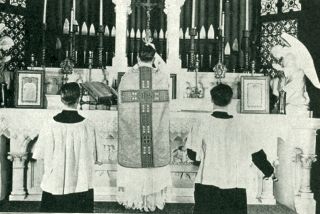
Docetism is a term that comes to us from the Greek word "doketo." Doketo means "to think" or "to seem." An early heretical group, the gnostics, claimed that Christ did not truly appear in the flesh, but merely "seemed" to possess a body. Thus, the gnostics taught docetism. This was a denial of the true flesh of Christ and a heretical challenge to the fundamental doctrines of the incarnation and the substitutionary atonement. If Christ merely appeared to be human or have a body, He did not pay for the sins of the world on the cross. In fact, He did not become human and has in no way shared in our humanity. The apostle John addresses this error in his first epistle to the church, saying, "every spirit that confesses that Jesus Christ has come in the flesh is from God, and every spirit that does not confess Jesus is not from God." 1 John 4:2
But the reformed denial of the true, bodily presence of Christ in the supper is a sort of sacramental docetism. That is, they deny the very words of Christ in the institution of the Supper as being in any sense real. Classically, the reformed have done this on the same basis as the underlying philosophical position of the gnostics. That is, they deny any real connection between the human and divine natures of Christ. The communication between the divine and human natures has always been a problem for the reformed. That denial has real consequences in their view of the nature of the Lord's Supper. They deny that Christ's body is actually or really present, distributed and received in the Sacrament at the Altar. They are in effect Sacramental Docetists.
Lutherans boldly confess the true, bodily presence of Christ in the Holy Supper. We confess it in word and deed. How can we confess the true, bodily presence of Christ by our deeds? Christians have historically done this by reverencing the elements at the consecration. First, it should be clear which elements we reverence. We do not, as some say, reverence the bread and wine. That would be idolatry. We reverence the heavenly elements of Christ's true, physical body and blood which are, "in, with, and under," the earthly elements. We do so by bowing deeply or genuflecting at the consecration and elevation. With these bodily actions we are making a bold confession of the true, bodily presence of Christ in the Sacrament. Christ has come physically and really into our presence in the consecration. How can we do other than humbly and reverently acknowledge that presence?
This may seem foreign at first, maybe a "little catholic." Of course, it is. It's what catholics, Lutheran, Roman, and Greek, have done for centuries. It is also a confession against the Sacramental Docetism of American Evangelicalism.

1 comment:
Nicely said. I always appreciate it when I visit Gethsemane and see you showing reverence in the way you describe. For some reason our pastor doesn't do that.
Post a Comment